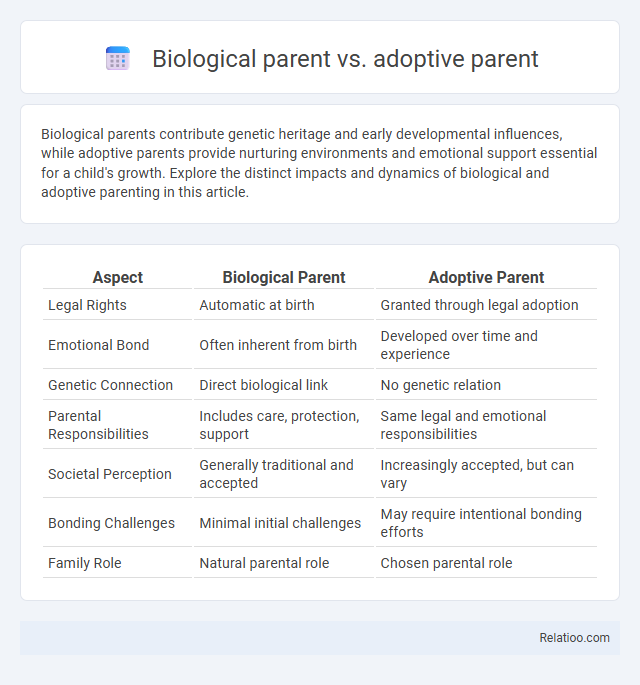Biological parents contribute genetic heritage and early developmental influences, while adoptive parents provide nurturing environments and emotional support essential for a child's growth. Explore the distinct impacts and dynamics of biological and adoptive parenting in this article.
Table of Comparison
| Aspect | Biological Parent | Adoptive Parent |
|---|---|---|
| Legal Rights | Automatic at birth | Granted through legal adoption |
| Emotional Bond | Often inherent from birth | Developed over time and experience |
| Genetic Connection | Direct biological link | No genetic relation |
| Parental Responsibilities | Includes care, protection, support | Same legal and emotional responsibilities |
| Societal Perception | Generally traditional and accepted | Increasingly accepted, but can vary |
| Bonding Challenges | Minimal initial challenges | May require intentional bonding efforts |
| Family Role | Natural parental role | Chosen parental role |
Understanding Biological and Adoptive Parenthood
Understanding biological and adoptive parenthood involves recognizing that biological parents provide genetic connections and prenatal care, while adoptive parents offer legal and emotional guardianship without genetic ties. Your role as a parent is defined more by the commitment to nurture, support, and raise a child than by genetics alone. Both biological and adoptive parenting contribute uniquely to a child's identity and well-being.
Legal Definitions and Parental Rights
Biological parents are individuals with a genetic connection to a child, holding automatic parental rights and responsibilities by law. Adoptive parents gain full legal parental rights through formal adoption processes, which transfer all responsibilities and rights from the biological parents. Legal definitions establish biological parents as the original legal guardians, while adoptive parents receive equivalent status post-adoption, ensuring equal rights in custody, decision-making, and child welfare.
Emotional Bonds: Nature vs Nurture
Emotional bonds between biological parents and children often stem from genetic connections influencing instinctual attachment behaviors and hormonal responses such as oxytocin release. Adoptive parents develop strong emotional bonds through consistent caregiving, nurturing environments, and shared experiences that foster trust and security over time. The interplay between nature and nurture highlights that while biology contributes to initial bonding potential, nurturing relationships play a crucial role in sustaining deep emotional connections across both biological and adoptive families.
Parenting Challenges and Rewards
Biological parents often face challenges related to genetic health and inherited traits while navigating emotional bonds formed from birth. Adoptive parents encounter unique obstacles such as integrating a child's background and fostering attachment amidst potential identity questions, yet they experience profound rewards in providing stability and unconditional love. Both roles demand resilience and dedication, with the shared reward of nurturing a child's growth and well-being despite differing origins.
Identity and Heritage in Children
Biological parents provide children with genetic ties, influencing physical traits and inherited health risks, which contribute to a sense of identity rooted in biological heritage. Adoptive parents shape identity through shared experiences, cultural values, and emotional bonds, often enriching a child's understanding of family beyond genetics. Your child's sense of self and heritage flourishes when both biological origins and adoptive connections are recognized and honored, fostering a holistic identity.
Societal Perceptions and Stigma
Societal perceptions often favor biological parents for their genetic connection, attributing inherent legitimacy and emotional bonds to biological ties. Adoptive parents frequently confront stigma rooted in misconceptions about their capability to provide genuine parental love and identity formation for the child. Blended families with both biological and adoptive parents challenge traditional norms, promoting evolving societal acceptance yet still encountering conflicting attitudes toward parenting roles.
Psychological Impact on Parents and Children
Biological parents may experience a deep emotional bond formed through genetic ties, while adoptive parents often navigate unique challenges in establishing attachment and identity with their child. Children raised by adoptive parents can benefit from stable and nurturing environments but might also face questions about belonging and origins, impacting their psychological development. Your support and understanding play a crucial role in fostering healthy relationships and emotional security in both biological and adoptive family dynamics.
Role of Genetics in Parenting
Genetics play a crucial role in biological parenting by directly influencing a child's physical traits, health predispositions, and certain behavioral tendencies inherited from biological parents. Adoptive parents, while lacking genetic ties, contribute significantly through nurturing, environment shaping, and emotional support, demonstrating that parenting extends beyond genetics to include social and psychological influences. Your relationship with your child flourishes not only from shared DNA but also from the consistent care and bonding that build strong family connections.
Navigating Adoption Disclosure
Navigating adoption disclosure requires clear communication between the biological parent, adoptive parent, and child to foster trust and understanding. Your approach to sharing the adoption story should prioritize the child's emotional well-being, ensuring they feel secure and loved by both families. Effective disclosure encourages healthy identity development and strengthens relationships across biological and adoptive family connections.
Support Systems and Community Resources
Biological parents often rely on familial support networks and established healthcare systems to navigate parenting challenges. Adoptive parents utilize specialized community resources such as adoption agencies, counseling services, and support groups designed to address unique emotional and legal aspects of adoption. Both types of parents benefit from parenting classes, social services, and local organizations that provide education and social support tailored to family dynamics.

Infographic: Biological parent vs Adoptive parent
 relatioo.com
relatioo.com